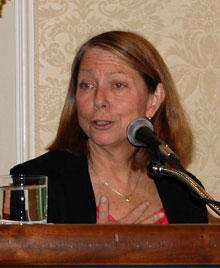News Coverage of Foreign Affairs and National Security
Jill Abramson, Executive Editor of The New York Times
Photos | Transcript

Washington, DC—On March 28, 2013, New York Times Executive Editor Jill Abramson joined New York Times Deputy Washington Bureau Chief Elisabeth Bumiller for a discussion on News Coverage of Foreign Affairs and National Security. Abramson emphasized the importance of international news coverage to The Times, noting that the paper had not made any cuts to its foreign bureaus or correspondents despite financial pressures. She also addressed the difficulty of balancing coverage of conflict zones with the safety of her journalists. Other topics covered included lessons learned from the paper's coverage leading up to the Iraq War and the impact of hacking on reporting in China.
Abramson discussed the recent decision to rename The International Herald Tribuneand introduce The International New York Times to bolster the paper’s international presence. The Timescurrently has 17 international bureaus and utilizes local freelance journalists—know as stringers—in dozens of countries to ensure detailed accuracy for every story. When asked where she would like to open more bureaus, Abramson responded that the greatest need is in Latin America, where The Times currently has only one bureau, in Mexico City, as well as correspondents based in Venezuela, Brazil, and Argentina. She would also like to have an increased presence in Africa, where the paper has only three full-time bureaus. Abramson underlined that the budget cuts and economic recession had not impacted The Times' foreign coverage and that the paper is hiring, not shedding staff. The Times' revenue from subscriptions (both print and online) currently exceeds their advertising revenue, which she says shows that “print is far from dead."
The most difficult part of her job, Abramson said, is balancing the imperative for news coverage with the safety of her journalists. She has to weigh the rewards of getting firsthand coverage in conflict zones with the risks. On a personal note, Abramson shared the stories of some of the recent kidnappings and deaths of Times journalists, including her friend, Dan Pearl. In addition to Times reporters, Abramson recognized the huge risks taken by stringers and foreign national freelancers, without whom, she said, The Times would be unable to function.